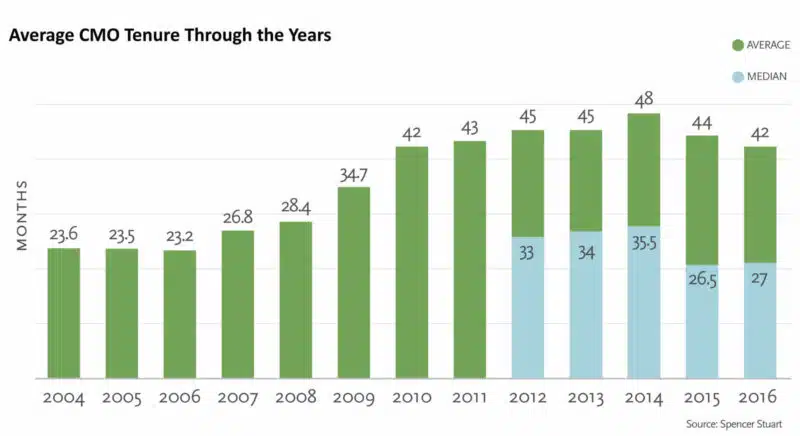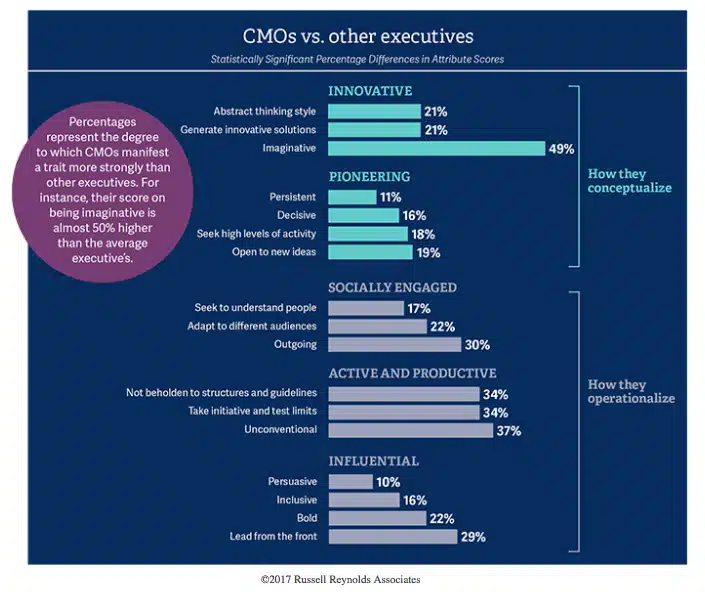7 shared traits of CMOs that thrive in the martech age
Contributor Andy Betts details the characteristics that help modern CMOs stand out.

The transformation that many CMOs have been through over these last decades has been radical. Everything from their playing field to their equipment to the skills required of their team members has massively changed. They’ve had to update not just their approach, but their entire mindset.
As in any field, we’ve seen some CMOs not only thrive but rise above and lead the rest of the pack confidently into the martech age. Where others have stumbled or struggled to get their footing, a rare breed of exceptionally successful CMOs have excelled. They’re excited, not intimidated, by new martech possibilities.
Forward thinking and progressive, these most successful of the modern day CMOs love a data challenge they can really sink their teeth into. Here are a few of the other traits they share:
1. They’re ambitiously innovative
In 1968, David Ogilvy wrote a guide for Ogilvy & Mathers managers on what it took to get promoted rapidly in their organization. The top of his list? Ambition, followed by “the person works harder than their peers–and enjoys it.”
Outstanding CMOs are pioneers, pushing the rest of the C-level out of their comfort zones. This is particularly true in the realm of martech, as the rest of the organization turns to the CMO for guidance and leadership in navigating a technology landscape some 5,000 tools strong and counting.
Perhaps this is why CMOs tend to last only 42 months in each organization? A Spencer Stuart study of CMOs from 100 of the top US ad spenders found that the average tenure for CMOs fell to 42 months in 2016, down from 44 months in 2015.

2. They’re digital savvy
The best CMOs know that technology enables strategy; it doesn’t replace it. Digital technology and martech are giving greater insight than ever before into consumer behavior and needs, and savvy CMOs are tapping into this wealth of data. According to the Gartner 2017-2018 CMO Spend Survey, CMOs allocate 9.2% of their total marketing expense budget to marketing analytics — the most of any of 13 capabilities measured. For 2017-18, marketing analytics leaped to the number one area of spending, from its place at number four in 2016-17 (behind website, digital commerce and digital advertising).
With these increased capabilities comes even greater responsibility and expectations for accountability. In a blog post last year, Ewan McIntyre, a Gartner research director studying marketing leadership, wrote, “…Where budgets have increased, so too have the demands being made of marketers. Long story short, you’re now in a position where you’re being asked to do a lot more with a little more budget, from martech to analytics to innovation and customer experience.”
The most successful CMOs today are digitally savvy and strategically shrewd. They know that the martech in and of itself is no guarantee of success, and focus on finding platforms (rather than multiple tools) that result in a demonstrable return on investment.
3. They’re customer focused
The best CMOs aren’t trying to sell; they’re solving a problem for their customers. Relevance and utility are their secret weapons, and superior customer experience their Holy Grail. Yet while businesses cite “evolving customer behaviors and preferences” as the top driver of digital transformation, fewer than half invest in understanding digital customers, according to an Altimeter study on digital transformation.
Exceptional CMOs are highly attuned to the nuances of their customer’s journey, from discovery to evaluation to fulfillment and on through to various stages of loyalty. On average, according to McKinsey, B2B customers use six different channels when making a buying decision, and each one may be managed by different parts of the organization. CMOs able to turn their understanding of the customer journey into ROI are proving incredibly valuable to brands; in fact, McKinsey estimates that excelling here can increase a company’s revenue growth 10 to 15% and lower costs by 15 t0 20%.
4. They have unusual left & right brain balance
CMOs are at once analytical and artful; they’re imaginative and methodical. Exceptionally successful CMOs are on the cutting edge of new technology, but also understand the questions they’re trying to answer with it.
They’ve determined the challenges they want technology to solve within the customer journey and across the marketing organization. They’re looking at increasingly creative and innovative technology-enabled experiences through a scientific lens, testing and proving out their theories with greater scrutiny and accountability than ever before.
This innate ability to think both creatively and logically will only grow in importance as technologies like AI become more mainstream. AI might still seem abstract and futuristic for some, but the reality is that it’s working its way into martech stacks and workflows as we speak.
A recent Gartner survey showed that 59% of organizations are still gathering information to build their AI strategies, while the remainder have already made progress in piloting or adopting AI solutions.
5. They’re courageous
In a Russell Reynolds Associates study that compared 36 CMOs to a broader subset of C-Suite executives via psychometric testing, CMOs displayed significantly more imagination, innovation and pioneering spirit. This research found that CMOs more often have the courage to be disruptive, as well as the leadership and behavioral traits to pull it off.

Compared to CIOs and CTOs, CMOs are 37% more unconventional, 21% more likely to generate innovative solutions and 49% more imaginative. When it comes to testing the limits, your CMO is 34% more willing to do it.
Courage is an incredibly important trait in the constantly shifting and evolving martech landscape, where ad tech and martech are increasingly converging and consumers demand the breaking down of barriers to their seamless decision-making.
6. They’re masterful communicators
As barriers fall and silos are flattened across the organization, the most exceptionally successful CMOs are developing and leading in a collaborative team culture. They know when to listen, are comfortable asking for feedback, and empower their team to perform at their best.
These CMOs communicate effectively within their team, but also across the organization as a whole. As companies are increasingly using marketing analytics in corporate decision making (and investing more in marketing as a whole), all eyes are turning to the CMO to activate their data and make it meaningful. More and more, it’s the job of the CMO to be the connector, bridging the gaps between departments and bringing all players onto the same page.
7. They’re contagiously agile
By now, you may be thinking a successful CMO needs to be everything to everyone. That’s not far off the mark. The role of the CMO is becoming increasingly fractured, requiring great agility to manage. There are three distinct activities now required of all CMOs, according to Harvard Business Review:
- Discovering data-driven insights that drive growth.
- Designing the right strategies and processes to carry out the company’s vision in a multi-channel world.
- Serving as the organizational “glue” for driving change.
Marketing is no longer a standalone department; it’s larger, more diverse and further reaching than ever before. As the person who leads this critically important department, the CMO may actually be leading across a wider swath of the organization or even leading organizational change as a whole.
Barbara Martin Coppola, chief marketing officer of Grubhub, is one such exceptional leader. In her first year, she uncovered the relevance of the food delivery brand’s data and built a data science team that uses algorithms to uncover the brand’s most engaging stories.
Under her leadership, marketing evolved from quarterly campaigns to a constantly testing, fact acting and agile brand with a risk-taking culture. The impact spanned far beyond marketing’s borders, though; in fact, the company’s new Analytics & Strategy group steers all departments toward their goals.
Could you be an exceptionally successful CMO?
If the science of machine learning applications and data algorithms excites you as much as the creativity of campaign planning, you’re off to a running start.
As you evolve and grow professionally, be intentional about developing the traits that will help you succeed in technology-charged environments. Craft a “marchitecture” that delivers the agility and infrastructure needed to keep pace with connected consumers.
Want to learn more about exceptional CEOs? Download “CMOs at the Wheel” to learn from the marketing leaders from companies such as Belkin, GE Healthcare, Hilton, Oracle and Grubhub interviewed by MarTech Today contributors Erica Seidel and Nadine Dietz.
Opinions expressed in this article are those of the guest author and not necessarily MarTech. Staff authors are listed here.
Related stories